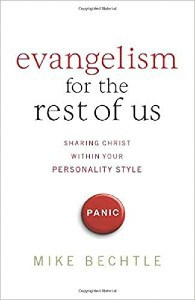John Fuller: Well, today on Focus on the Family, we’ll examine why so many of us struggle to share our faith.
Dr. Mike Bechtle: And I remember how I felt, I thought, okay, I did it. I did what I’m supposed to do. God’s happy with me and I didn’t feel the guilt anymore. It’s almost like a smoker that once they have a cigarette, they’re not craving it for a while. And then a couple months later, I was still basking in that. Well, last time I shared my faith in fact, last week with somebody at McDonald’s and it worked for a while but then I thought I felt guilty again. It’s like, if I really cared about those people, I probably wouldn’t, I wouldn’t be craving it later. It would just be so satisfying each time and that’s when I thought, why didn’t God make me this way? What if there’s a different way? What if it’s not the Great Commission that’s the problem? Maybe it’s that I’m listening to the methods. And what if there’s more methods than I’m hearing?
John: That’s Dr. Mike Bechtle recalling his own inner angst about witnessing to others and how God changed his expectations of what effective evangelism looks like. And Dr. Bechtle is back with us again today, your host is Focus president and author Jim Daly, and I’m John Fuller.
Jim Daly: Uh, John, we had a very insightful conversation last time with Mike about what I believe are common, uh, misperceptions of evangelism, where some have thought we need to confront people with God’s truth instead of befriending them. Uh, or we viewed nonbelievers as some kind of project or agenda item on our to-do list. Unfortunately, many Christians feel like our responsibility to evangelize is a burden and we’ve completely lost sight of the relational part and what it means to live out our faith in tangible ways before others.
John: Yeah. I think you’re right and there seems to me there’s an aspect of fear as well, Jim. Um, I might say the wrong thing, I might be ridiculed for my beliefs-
Jim: Yes, and yes.
John: … and we also talked about introverts like myself and extroverts like you and how that dynamic plays into evangelism.
Jim: That’s so right John and the bottom-line message from Mike is that you don’t have to fit into some kind of prescribed pattern or formula for sharing your faith. God can use your unique personality and talents for his purposes. All you need is a willing heart and a desire to love people well, everyone, I think can do that.
John: Mm-hmm.
Jim: If you missed our program last time, uh, get the download or get a CD copy from us because this content is so encouraging and faith building and I’m looking forward to continuing the conversation with Mike about his book Evangelism for the Rest of Us: Sharing Christ Within Your Personality Style.
John: We’d be happy to tell you more about the book and how to get an audio copy of the last program and today’s as well, just call 800 the letter A and the word FAMILY. 800-232-6459, or stop by focusonthefamily.com/broadcast. Last time we included a Q & A session with our live audience, a group of young adults who served as summer interns here at Focus on the Family and we’ll hear more from them in just a little bit. Right, now Jim, here’s how you started part two of our conversation with Dr. Mike Bechtle.
Jim: Mike, let’s get very specific on this. You, you have attributes in the book that described the extrovert. You’re alluding to those things but let’s get real detailed on it, the extrovert and how they act and behave and you’re touching on it. But again, let’s go a little deeper. Let me give you some data. Uh, and this is toward the introvert side, how God can use introverts. Um, they tend to be 25% of the population but they’re 60% of the gifted population. And I see that I have a boy and one of my sons who is more introverted, man he can zero in on something. Neurobiology is what he’s looking at right now, I mean he can tell me so much about it ’cause he’s read it. He wants to answer the questions that he has in his mind. He, he doesn’t wanna be an inch deep. He wants to be a mile deep-
Dr. Bechtle: Mm-hmm.
Jim: … when it comes to knowledgeable, uh, study and all that. So, I mean, there is a great attribute to the introverts. We tease about it but it’s very true. They wanna have the right answer-
Dr. Bechtle: Mm-hmm.
Jim: … not just an answer.
Dr. Bechtle: Well, I think part of it is just how they operate. Most people think of extroverts as being, uh, loud and bold.
Jim: (laughs)
Dr. Bechtle: Um, in some cases, uh- … in- introverts are normally seen as being quiet and reserved and that’s usually not the case. They’re not shy. That’s a different issue. Introvert, it usually comes from where you get your energy.
Jim: Mm-hmm.
Dr. Bechtle: So, extroverts, they get energy from being around people. And so, you put them in a room full of people, their energy actually builds.
Jim: Yeah. The end of the party, they’re actually-
Dr. Bechtle: Oh yeah, they, they’re pumped-
Jim: … on the roof.
John: … don’t, don’t stop now (laughs).
Jim: Yeah. It’s just getting started.
Dr. Bechtle: Yeah. And you walk, you, an extrovert walks into a party and they’re thinking, “How long will it take me to, to talk to everybody in the room?” Whereas an introvert will go in and say, “Okay, what one or two people can I talk to for about 45 minutes each and that’ll be my evening.”
Jim: Yeah.
Dr. Bechtle: And at the end of that event, they’re just drained. It doesn’t mean they don’t enjoy it, or they can’t communicate well. Uh, which is interesting because most people think pastors tend to be all extroverts. And actually, a majority tend to be introverts-
Jim: Interesting.
Dr. Bechtle: … because they have more of a sensitivity. They pick up quicker on what’s happening around them. And, uh, it’s just a matter of where they get their energy and how they use that. So, it’s a different ball game. I’m the introvert. I’ll go find a person. I can have a really deep conversation with them at a party and we’re both loving it.
Jim: Yeah.
Dr. Bechtle: And an extrovert will go in and just wanna move from person to person and just loves it.
Jim: (laughs) Right.
Dr. Bechtle: And there’s needs on both sides there, so.
Jim: Yeah. And I guess that’s one of the important disclaimers we have to give is that God has wired both. I mean, it’s interesting to me that it’s a set pattern, that there’s not a third type in that regard-
Dr. Bechtle: Doesn’t seem.
Jim: … introvert, extrovert. Maybe somebody that can operate in the middle, uh, with some fluidity but generally that’s it. There isn’t another type. God has wired this for a purpose.
Dr. Bechtle: Yeah. And I think there are different methods because for an introvert to use the methods of an extrovert and vice versa, it’s like a, an eagle telling a turtle how to move around. It’s like, you don’t want to learn from an eagle, you learn from another turtle or from another ea- it’s not that one’s bad or the other one’s good but it’s like being who God made us. And then using that.
Jim: Yeah.
Dr. Bechtle: That’s why there’s some real specific things for an introvert.
Jim: And in that regard, uh, talk about the comment that is very common which is, you know, I just don’t have that gift. I don’t have the gift of evangelism and the Bible does talk about it-
Dr. Bechtle: Mm-hmm.
Jim: … in that way. Some will be teachers, some will be evangelists, et cetera. Certainly, provides a big door for a person that struggles with evangelism to walk through. That’s not-
Dr. Bechtle: Yeah.
Jim: … my gift.
Dr. Bechtle: Well, I think it’s how it’s positioned because I think introverts probably can do better at evangelism in a lot of cases. They’re just not going to do it in the same way. And it’s like, I don’t go door to door. I don’t go stand on the street corner but there’s other things that they can do. I mean, one example I had was when I was in college, I started, that’s when I started writing and I worked for the largest, uh, Christian publisher, Sunday School Curriculum in America. And I was doing their high school lessons. And this was back when they had dated curriculum. So, on a particular date, every church in the country, there were 60, about 60,000 churches using this curriculum. So, they were all doing the same lesson. And so, I would, was writing their high school curriculum and once a quarter, they wanted the plan of salvation presented. And I remember that I knew what was happening each Sunday. One Sunday morning, I got up and thought, “Okay, I did the math.” We had 60,000 churches that I had written this lesson for with training for the teacher and how to present the gospel. That, okay, so 10 students was average back then in America, how many students were in a Sunday school class, a high school Sunday school class in America. So that means that morning, 600,000 people got to hear the gospel because of what I wrote. And I thought, “What if one 10th of a percent responded?” So, one out of a thousand accepted Christ, that means that day, I got to be a big part of leading 600 people to Christ. Now that’s what an introvert does. And is that less valuable than what an extrovert does? It’s a different method. And I think to see the strength that comes out of that, that’s why I’ve seen so many people just wake up to evangelism that are introverts-
Jim: Yeah.
Dr. Bechtle: … when they realize they don’t have to do it the way they were told but God’s q- equipped them.
Jim: When I liked that idea, that by all means-
Dr. Bechtle: Yeah.
Jim: … share the gospel.
Dr. Bechtle: Uh-huh.
Jim: I mean, whatever gifting you have, whatever bent your personality is. I- in your book Evangelism for the Rest of Us, you identify three ways that Jesus, let’s go to the source, that Jesus modeled God’s love for others. How did he evangelize obviously? Um, that’s a great thing to do is, what was the example that Christ gave us?
Dr. Bechtle: I think the, we usually think of him with the multitude but it’s interesting. He didn’t spend much time with the multitude. And he didn’t go after the multitude. He hung out with his disciples. All these people started showing up. So, it wasn’t a prepared event. He spent most of his time, He had his disciples, that’s where He put his focus and built into them. And of those, He had the three that He really involved with. And then those three went out and really changed the world.
John: Hmm.
Dr. Bechtle: And so, He invested one by one. And so, He always cared about people. And then the idea that He met people right where they were. Think of the woman at the well-.
Jim: Right.
Dr. Bechtle: … He didn’t start sharing the gospel with her. He talked about water. He was thirsty. She had the ability to get it. And then He started talking to her about her past and her family and those kinds of things. So, He met her at her point of need. It wasn’t a project. It was a compassion type of thing.
Jim: Well, I was just gonna say, the other thing too is that Jesus didn’t seem to concern himself with how people responded to what He shared.
Dr. Bechtle: Mm-hmm.
Jim: I mean, He just, He went right to it and most people responded with, wow, this guy has spoken right to my heart. You know, the woman at the well is a great example. She ran to-
Dr. Bechtle: Yeah.
Jim: … town saying, “I think I’ve met the Messiah.” Right?
Dr. Bechtle: Mm-hmm.
Jim: ‘Cause He’s shared with me every, He knows me, even though He doesn’t know me.
Dr. Bechtle: Yeah. Well, that’s how he built trust because he met her at her point of need. I think, what can we do to match that? Well, I’m not Jesus but if I can build trust with someone through meeting where they are, the common ground, the real issues in their life and just being there for them. Um, Jesus had a lot of patients. He didn’t force people to come to him. And I think if I can have patients to not have to push, to try and wrap things up but to be intentional. I mean, we are called to present Christ to people. And that comes especially for an introvert through relationships. When I can care, and people know that. When I build that trust, it gives the foundation. So, at a certain point, if someone is going through something really rough, who are they going to talk to? The person that they build trust with.
John: Yeah. Yeah. If the perceive that they’re a project, then they’re not gonna come to you at a point of need.
Dr. Bechtle: Yeah.
Jim: It’s so true. But I think this is one of the great weaknesses of the church today in modernity. It, it doesn’t have time to develop those-
Dr. Bechtle: Mm-hmm. Yes.
Jim: … relationships.
Dr. Bechtle: Mm-hmm.
Jim: And it’s probably the greatest weakness that we have. Uh, you know, we’re busy, we’re all running around doing things and we’ve got meetings to go to and places to fly to. And we don’t really stop to know our neighbor to find out where their point of need is right to-
Dr. Bechtle: Yeah.
Jim: … what Jesus did exemplify for us. And somehow we have to get control of that and understand what the eternal things are in this life and starting with your family, your kids and then beyond that, your friends and then your neighbors and people that God brings to the well in your life.
Dr. Bechtle: Well, and I think that goes back to your earlier, um, question about what’s changed now, why aren’t people sharing and they used to. And I think part of it is, they tried, and it was never something people were comfortable with. It’s easier to just stop doing it than to deal with the guilt.
Jim: Hmm.
Dr. Bechtle: And now we’re in a place where after having not done it for a while, there’s a lot of other things we can do.
Jim: Yeah.
Dr. Bechtle: And we get busy with things that are urgent but they’re not important.
Jim: Mike, I think one of the key things that I’ve experienced in my life is just be on the ready.
Dr. Bechtle: Yes.
Jim: You know what I mean by that?
Dr. Bechtle: Mm-hmm.
Jim: Um, you never know when the Lord’s gonna present or bring someone across your path and you just haven’t, have to have an attitude of that antenna being sensitive enough to hear a point of pain, a question, whatever it might be. And there’s so much going on-
Dr. Bechtle: Yeah.
Dr. Bechtle: Yeah.
Jim: … in the news and everywhere else that you don’t have to look very far, um, to find a carrot back to your (laughs) daughter’s analogy that’s ready to pick.
Dr. Bechtle: Yeah.
Jim: You know, you can identify somebody who’s actually struggling. And then the sensitivity to actually ask questions like the Lord did that lead someone into an internal discussion, right?
Dr. Bechtle: Yeah.
Jim: In their own head. Like that’s a good point and that’s great work if you can do that. Um, I think it’s a wonderful way to see things. Um, let me go to the last question and we’re gonna have some Q & A now and, and we gonna have some interns servicing young people. We’re gonna let them come to the microphone and stump you with some great challenges on evangelism but probably the most difficult people to evangelize are family members.
John: Hmm.
Jim: They know you; they know your warts. They know when you came to Christ ’cause you’ve told them 14 times. You may have even called the family meeting together to make sure you know where I’m coming from. (laughs) And you know, and that’s all good but they can be some of the most difficult people to win to Christ for all kinds of reasons. So, in that context, uh, what advice or encouragement do you have for the family member situation?
Dr. Bechtle: You know, I think about the fact that they were supposed to pray for opportunities. We pray for our family members, but it’s almost like when you read a book and it’s got a scripture passage in it, we, we know it already so we skip over it. So, we, when we hear that we’re supposed to pray for our family members., um-
Jim: Yeah.
Dr. Bechtle: … we take that lightly and realize, God is the one that is drawing people to himself. And so, what do you do with family members? And I think they know where we’re coming from and we can still present when it’s appropriate. But in Romans 2:4 it says that God draws people through kindness. It’s his kindness that brings them to repentance. It’s not the logic and in a book like Romans, it’s all logic.
Jim: (laughs) Right.
Dr. Bechtle: And for him to say, what brings people to Christ? It’s kindness. And to be able to build that into our relationship, to keep loving him, be intentional about kindness, be intentional about, uh, building the trust, the relationship and still be intentional. But if, it’s too often, we get desperate because they haven’t responded. So, we try and do it even it’s like, maybe we just need to love them harder.
Jim: Yeah.
John: All right. Uh, at this point in the conversation, we turned again to our live audience of students for a Q & A session starting with this first question.
Isaac: Hi. Uh, I’m Isaac Irvin from Indianapolis, Indiana. And my question is, so you’ve mentioned a few times the importance of relationships when sharing your faith. And I’m curious what your opinion is of cold evangelism. So, approaching a stranger to have a spiritual conversation but without really an intention to form a relationship. And, uh, if you think that there’s still a place for that in Christianity today.
Jim: Hmm.
Dr. Bechtle: Good question. I think there is a place for it. For an introvert, it’s not gonna happen very often. For an extrovert, it could happen a lot more often but I think it goes back to the need of the moment that if God is nudging me to do that, and I’ve been in those situations where He says, “That person now.” It’s like, that’s what obedience is. Uh, but in a lot of cases, if He isn’t nudging me to do that, then there’s a chance that I could turn somebody off based on just approaching him that way. When I was in college, I had a classmate that went out on the streets of downtown Phoenix and he had a project he’d put together.
Dr. Bechtle: He wanted to see how many women he could ask to kiss him before they would actually do it. And he just, got ’em on the street and he asked, I think he got to 98 and he got slapped, he got sworn at. But finally, the 98th one said, “Okay.” And she gave him a kiss. And the thought would be, well, that was be like cold calling-
Jim: (laughing) Yeah, I’d say.
Dr. Bechtle: … you know, it’s just cold evangelism. You’re looking for a response. And you know, you could say, well, it was worth it because of that one person did it.
Jim: One out of a hundred (laugh).
Dr. Bechtle: Yeah. But what about all the other ones who now are even more jaded and, because of what happened there. So, I, I think there’s a place for it, but I want to be responsive first of what God asked me to do.
Jim: Yeah. Mike, you had a story about being on an airplane. This is so typical. Anybody that travels a lot-
John: We all have stories. Yeah.
Jim: … you get to that point where you just wanna put the headset on and it’s gonna be snooze time or catch up on work time and, and then you hear the Lord say, “Aisle three.” (laughs)-
Dr. Bechtle: Mm-hmm.
Jim: … or whatever. Uh, what was your experience?
Dr. Bechtle: Oh, I was, I, I had been, uh, leading a couple of seminars for several days and I was just exhausted. It was the end of the day, got on the plane, it was completely packed. And the only seat that was open was right next to me. And so, I’m thinking this is sweet. I don’t wanna talk to anybody. I wanna put my head on the window and just go to sleep. And so, I actually was thanking God for the fact-
Jim: (laughs)
Dr. Bechtle: … that the one open seat was that. And then they opened the door, the plane again-
Jim: Oh.
Dr. Bechtle: … and this man walked in. He was probably, I think he told me he was 85 years old. He was Chinese man. And he stood at the front and he looked around and then he saw me, he saw the open seat. He smiled so big and I thought, “Oh no.” And I thought, “Okay, I’m not going to share my faith with him. I’m not even gonna talk to him.”
Jim: (laughs)
Dr. Bechtle: I’m tired. And I told God this, “I am not happy about this. And if you, if you want me to talk-” ‘Cause I knew he was coming there. I said, “If you want me to talk to him, you’re gonna have to make it so obvious.”
Jim: So, you now into let’s make a deal mode.
Dr. Bechtle: Yeah. Yeah. And so, he came, and he sat down and got settled and he turned to me, he goes, “Hello. You tell me God.”
Jim: (laughs) Oh man.
Dr. Bechtle: And I s- said, “What?” He said, “You tell me God.” I said, “You want me to tell you about God?” He says, “Yes.”
Jim: Oh, my goodness. Okay. Now people are going, “You gotta be kidding me, come on.”
Dr. Bechtle: Well, I mean, it was, okay, so this was kind of obvious. And I still would not-
Jim: (laughing) You think?
Dr. Bechtle: Yeah.
Jim: That doesn’t say much for, you know, your willingness to respond to God. He’s gotta talk to you that clearly.
Dr. Bechtle: Oh, I, I’m still grumpy, you know, about it at right after that. And, and so I thought, okay, I’ll talk to him. But I,
Jim: (laughs)
Dr. Bechtle: … I told God, I said, “I am not very pleased with you right now because you made it obvious.” But we talk and it turned out. He, he flew quite a bit and he was learning English. And this was, he thought that was a good topic-
Jim: Yeah.
Dr. Bechtle: … to bring up the to- so we went through the, spent the whole time, of course he was hard of hearing as well.
Jim: (laughs)
Dr. Bechtle: So, he’s, I’m having to almost yell answers as I’m share-
Jim: (laughs) It’s somebody else’s [inaudible]
John: So, the Lord has several aisles nearby, ready to hear your great presentation of the gospel?
Dr. Bechtle: Yeah. And that was even worse for an introvert to have to yell the gospel in, in a plane.
Jim: It could have been intended for an entirely different person.
John: Yes.
Jim: You never know.
Dr. Bechtle: Well, We finally had almost, we were just about to land and it had been quiet for a while ’cause we probably talked for half an hour and as we’re landing, I thought I had a little copy of a tract the Four Spiritual Laws in my wallet. And I thought, I felt like God was saying, “Just, just give it to him.” I’m like, “No, I am, I don’t wanna talk to him anymore.”
Jim: (laughs)
Dr. Bechtle: And I said, “Okay, if he says one more thing about God, I will give him the tract.” And right before, I mean, we’re almost wheels down. And he said, “Thank you for telling me God.”
Jim: (laughs) Here’s a tract.
Dr. Bechtle: Pulled out the tract. I handed it to him.
Jim: That’s funny.
Dr. Bechtle: But it was because I had prayed in the moment for, in the moment, you know, show me what you want me to do now that’s called evangelism. But it was because he told me to do it.
Jim: Yeah.
Dr. Bechtle: And I think that’s what being responsive is-
Jim: (laughs)
Dr. Bechtle: … and why prayer is so important that we ask God to set things up and guide us into what he wants us to do.
Jim: All right, next question.
Ellie: Hi, my name is Ellie. I’m from Farmers Branch, Texas. And I just think scripture is so clear that we should surround ourselves with fellow believers, people who are gonna push us in our relationship with God but how do we avoid limiting ourselves to only those Christian circles so that we don’t limit the spread of the gospel because we’re comfortable.
Jim: Yeah. Yeah.
Dr. Bechtle: I used to years ago, I taught at Biola University and I had a, a class on evangelism and discipleship and I gave an assignment similar to what John had mentioned that sometime during the semester, they had to have a conversation, not share their faith, have a conversation with two unbelievers. All I had to do was talk to them and I thought it was a pretty simple assignment. At the end of the class, two girls came up to me in tears. They said, “That’s not fair. We go to Biola. We don’t know any non-Christians.” I thought they were joking but they were serious. They wanted to do a paper instead, have an, an alternative assignment. And I started thinking about it, I thought, okay, so we’ve gotten to that point, Howard Hendricks said Dallas seminary used to say, “It takes the average new believer about three years to eliminate all the non-Christians from their life.”
John: Hmm.
Dr. Bechtle: I’m teaching this class; I’m teaching at Viola. And then as I was listening to that, I realized I don’t have any non-Christians and-
Jim: Right. Right.
Dr. Bechtle: … that, and that was one of the impetuses where God moved me into a corporate setting for the second half of my career because I wanted to be around, so I have, I have far more non-Christian people in my life now than I do Christians. They’re just friends, they’re coworkers, they’re colleagues, but that opens door for trust that they don’t have those kinds of relationships with other people. So, um, I think it’s really important to be not only just open but to seek out those kinds of relationship. But at the same time, have that strong base with your Christian colleagues and friends so that you get the encouragement to get the accountability but also have the opportunity.
Jim: Yeah.
John: Might be something as simple as just pray and the Lord will bring people into your life to make you uncomfortable.
Jim: (Laughs). And maybe not, maybe just to have friendship. That’s a good thing.
Kelly: Hi, I’m Kelly Conley. I’m from Mountain Home, Arkansas and Dr. Bechtle, unfortunately, many of my close friends and family members that were once believers have since rejected their faith. And I know you mentioned when evangelizing to your family members pray intentionally, show kindness, but what else can I do? And how do I approach that when they already know the nuts and bolts of the gospel?
Dr. Bechtle: When they already know the gospel, they have turned away from it is probably the time when a lot of believers have turned away from them as well. So, they feel like because I’m not doing that anymore that I’ve been rejected. They need somebody in their life that still accepts them and still loves them unconditionally just the way they are. That’s I think where the door gets opened to be able to have those kinds of conversations and just be the person in their life that stayed with them. I think more than anything else, especially family members. Um, I don’t want to reject somebody because they rejected their faith. It’s like, okay, that’s what they did but they’re still the same person. And I still need to just love them to pieces.
Jim: I think too, just living it out at that point, you just need to live your faith so well that they see a difference. And that to me would probably be the best witnessing I could do in that context ’cause almost anything you say will be used against you (laughs) in the family court. So I, I really, I think living it well is probably your best way to build trust with that family member again and then t- believe that eventually the Lord will give you that opportunity. That’s certainly my wife’s situation, she’s the only believer in her family. So you can imagine, uh, her family, I think sometimes scratches their head about us and what we believe but she’s living a very wonderful Christian witness in front of them and praying for them and loving them. And it’s beautiful to watch. All right. Last question.
Matthew: Hi, my name is Matthew Wolf. I’m from St. Louis, Missouri and I have a similar question. Uh, so you mentioned earlier, it’s very difficult to evangelize the family members and my father is not a Christian and he has told my mother and I who are both Christians that he does not want to be evangelized to anymore. So how do we go about that situation while still respecting their boundaries, especially with an immediate family member?
Dr. Bechtle: I think in that case, I would probably, I wanna be open and honest with them and have a real relationship. And that real relationship is gonna talk about whatever’s there. And I could even say, “I know you don’t want me to share anymore.” You know, where I’m coming from. It’s part of who I am. In fact, it is who I am. It’s my, it’s my life. To not share with you what’s happening with me, uh is disrespectful to you. It’s not part of a real relationship. So, I work on the love side of it. I look on the work on the relationship side, but I can, I will still share things God is doing with me or the experiences I’m having just to share my story. Um, I will respect his not wanting me to tell chapter and verse and you need to come to Christ. He knows all that. I just wanna love him, but still live that in front of him just like you shared.
Jim: Yeah.
Dr. Bechtle: Because that’s, um, my opportunity to use my story.
John: Yeah.
Jim: You know, I, I have a little different take on it in that all those things are true but I do think if your father’s in that place, the best thing you can do is be the greatest son you can be and let that speak for itself. Because I think when he’s on his death bed and you’re next to him, that’s what he’ll talk to you about is you’ve been the greatest son a father could have. And then you could say it’s because of my faith in Christ. I wanted to honor you. And that’ll be powerful. Mike, this has been so helpful. Wow, good stuff. It’s a little outside of the normal discussion that we have here on Focus on the Family but what a wonderful reminder that we need to be intentional about sharing our faith, not, uh, take the bait of the culture that we can’t or shouldn’t share our faith, I encourage young people. Man, you have heard some great comments from young people here. Uh, that’s why I have so much hope. Those were wonderful questions. And, uh, I think the bottom line is share the gospel within your temperament, within your talent that God has given you. That’s what you’re saying, Mike.
John: Mm-hmm.
Jim: And I hope you’ll pick up a copy of Mike’s book Evangelism for the Rest of Us right here from Focus on the Family. The great news is every penny goes right back into ministry. I don’t think that works with the other online retailers and, uh, you know, help the ministry out, uh, get a copy of Mike’s great book and also save a marriage, help a, a parent do a better job, save a baby’s life. I think that’s (laughs) worth it. And uh, we’ll say thank you for that gift by sending a copy of Mike’s book.
John: Donate today and get your copy of Evangelism for the Rest of Us when you call 800, the letter A, and the word FAMILY, or stop by focusonthefamily.com/broadcast. And if you are listening along or watching and thinking, I don’t know, even with this Jesus stuff, I don’t even know where to begin to know what to think about Jesus. Call us, uh, we have resources, uh, we have a little, uh, booklet called Coming Home that we can send you, it’s online as well. We want you to know the person that we’ve spent the last half hour or so talking about, Jesus. Again, our number is 800, the letter A, and the word FAMILY. And then, please join us tomorrow, as we examine some of the unique challenges that single moms face.
Pam Farrel: And in Psalms 27, it says, um, “He will keep me safe in His dwelling. He will hide me in the shelter of His sacred tent.” And that’s really a promise from God that he will take care of you, single mom. He will shelter you if you give Him a chance.



















